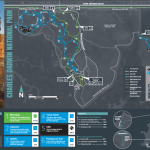Hydration for Mountain Biking in the Top End
We have some pretty specific needs for keeping well hydrated doing sport in the Top End, with strong heat and humidity, there’s a real risk of the heat taking a heavier than usual toll.
We reached out to the College of Health and Human Sciences at CDU for for their expert advice. They were kind enough to help us out with some valuable advice for best performance, and safety in the tropics.
Importance of Water
Water has many important roles in the body and is required to maintain blood volume and regulate body temperature. For a standard day, to prevent dehydration men need to drink 3-4L of water per day and women need 2-3L of water per day, however this will increase with physical activity and sports participation.
Water can be consumed by itself or as part of other liquid substance (energy drinks, soft drink etc. all contain water). Water can also be sourced from food, eg. Watermelon is >90% water and cucumber are 95% water.
Water is mainly lost through urine, breathing and evaporation (sweating).
Sweating is the body’s way of keeping cool. As sweat evaporates into the air it takes some of the bodies heat with it. Sweat rates vary from person to person and knowing how much you sweat and how much fluid you should be drinking is important.
Dehydration
Dehydration occurs when the body loses more water than is taken in.

In consideration of the high heat environment in Darwin more water will be lost due to sweating therefore more water needs to be consumed.
During high humidity in the build-up and wet season, sweating is less effective at cooling the body as sweat/water on the surface of the skin is not able to evaporate into the air. However, the body will continue to sweat, attempting to cool itself.
As you continue to sweat water is removed from the circulating fluid volume (ie. Blood volume), which in turn leads to less efficient delivery of oxygen and nutrients to working muscles as you perform activity.
Physical and mental performance is affected once approximately 2% body mass is lost through water. There is some evidence that lower levels of dehydration can also impair performance even during relatively short-duration, intermittent exercise.
Further dehydration can lead to dizziness and fatigue and in extreme cases seizures, cardiac arrest and death.
Considerations of electrolytes and other ions?
Osmolality is defined as the concentration of all solutes in a given amount of water and it is important for the human body to maintain a balance. Solutes are electrolytes such as sodium, potassium, magnesium, chlorine and calcium which are obtained from the food and drinks we consume.
You can have too many or too little of these electrolytes depending on the amount of water in your body, which affects the body at a cellular level. Water moves in or out of the cell depending on the concentration of electrolyte ions within and outside the cell, therefore it is important to ensure a relative balance is maintained.
When we sweat, we lose water as well as some of the electrolyte ions such as sodium chloride, hence why our sweat tastes salty. It is important to replace both these things post exercise. Studies have found 4gr of table salt + 15 grams of white sugar and 2 grams of Potassium chloride is an ideal rehydration drink.
Typically, these ingredients are found in sports drinks (Gatorade, Powerade etc.) however they have increased quantities of sugar and sodium which can be detrimental to health over long periods.
You can read more about the nutritional value and appropriate use of sports drinks
How much fluid and when?
The amount of water and when will depend on each individual’s preferences. It is always beneficial to start a sporting event hydrated. This leads to a lower risk of dehydration throughout the event, however drinking too much before and during an event can lead to increased urination and gastrointestinal discomfort.

Typically, water is good for hydration prior to an event however sports drinks can be useful as they provide carbohydrates which the body uses as fuel, the added sodium may reduce urine loss before exercise begins and decrease the risk of cramps during exercise.
To properly rehydrate after exercising you need to consume more water than you lost, around 150-200%. This is best to be done with consistent smaller, consistent drinks over a 4-6 hours after the completion of exercise rather than one large amount of water shortly after completing exercise.
You should avoid diuretic agents such as alcohol as this will not allow to retain as much water.
Acknowledgement
Thank you to Dr Alexander Engel from the College of Health and Human Sciences at CDU for their assistance in providing the specialist information for this article.
College of Health and Human Sciences provide additional programs, including strength and conditioning testing or programs or more individual specific information.
The Sports Dietitians Australia website provides lots of good information on the topic as well.
More Links
Cyclingtips:
https://cyclingtips.com/2019/08/beating-the-heat-how-to-ride-in-and-adjust-to-hot-conditions/
https://cyclingtips.com/2020/11/can-heat-acclimation-really-improve-endurance-performance/

